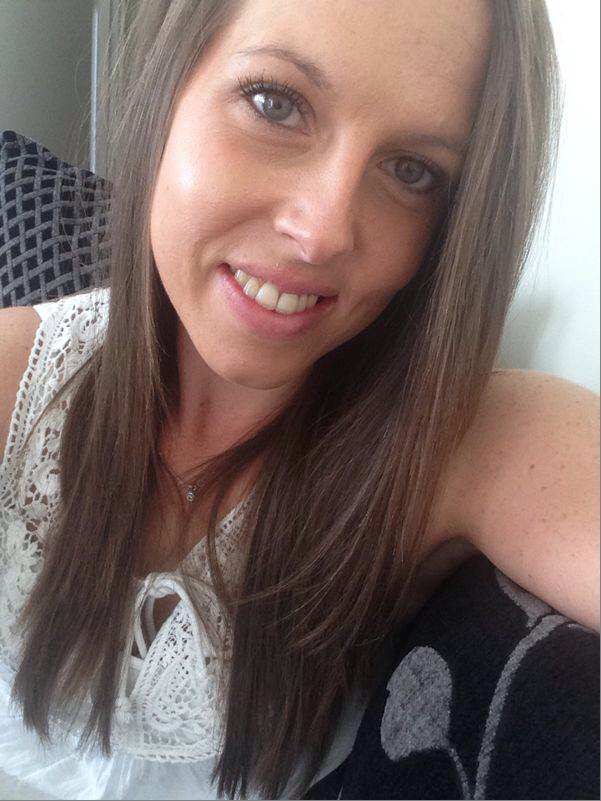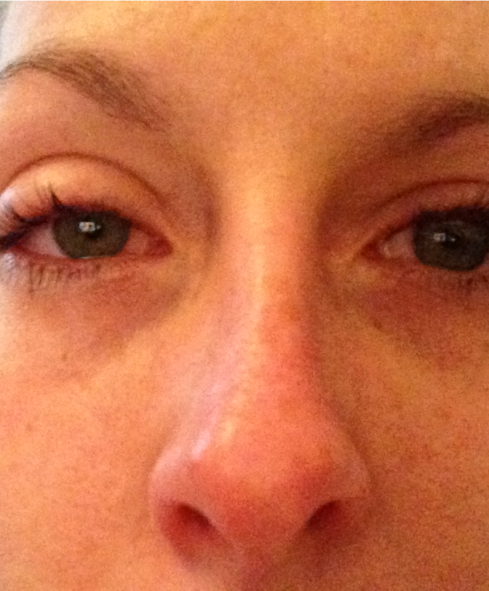Our patient, Lucy Garrod, tells her story
‘In Autumn 2006, I was getting an overnight boat from my home in Jersey to go back to university in Bournemouth, where I was due to start my second year studying commercial photography. I remember my eye kept watering – it became uncomfortable and got increasingly worse throughout the evening – the only way I can describe it is that it felt like I had scratched my eye.
‘Once my Dad and I had checked into our cabin on the boat, I took my contact lens straight out, as I thought there might be something stuck under it. As the evening went on the pain become worse, but I still presumed that I must have scratched my eye. Trying to get any sleep was a nightmare; the discomfort went from watering and scratchiness to constant shooting pains in my eye, which continued even with my eye closed.
‘In the morning my Dad looked over at me and his face dropped – “we need to get to a doctor”, he said. When I looked in the mirror I saw that my eye had completely swollen closed and was the size of a golf ball – just what I needed when I was going back to university!
‘We managed to get a GP appointment straight away, but I was told I just had an eye infection, and they prescribed me some drops. I knew it was something much worse, though – I have had conjunctivitis in the past, and this felt completely different.
‘Over the next few days the pain and swelling got worse so we decided to get a second opinion. We went to A&E where they did some tests and said that I had scratched a layer of the front of my eye – I was given some cream and told if it did not improve within a couple of days I should go to Queen Mary’s hospital as they had a specialist eye department.
‘Two days later I found myself at Queen Mary’s hospital. They did a series of tests which told them I had developed a corneal ulcer on the front of my eye as a result of bacteria that had become lodged behind the contact lens. I had to be admitted to hospital for a week, which I spent in a dark room as my eye was so sensitive to light. I had to put drops in every 30 minutes, 24 hours a day.
‘I was angry and frustrated as I had always been so careful looking after my eyes and contact lenses. I had worn them for many years with no problems at all, and now I was worried that I wouldn’t be able to complete my degree. On top of that, the pain was unbearable – I’ve never felt anything like it!
‘Throughout my time in hospital I underwent a series of tests and was told that, as the ulcer was just off centre, I would be left partially sighted in the right eye.
‘I was also told I would never be able to wear contact lenses again and that laser treatment would be out of the question due to the damage that had been done. I was devastated.
‘Once out of hospital, I returned to Bournemouth to start my second year at university. As the weeks went by I found it harder to complete work or even focus the camera. I was advised by my lecturers to take a year out, but this was the last thing I wanted to hear as I enjoyed university so much. I made the decision to give the first term a go to see if I could cope – I was determined to get my degree!
‘Now that my ‘shooting eye’ was partially sighted, I had to learn to use my other eye to shoot, which is like trying to teach yourself to draw with your left hand when you’re actually right handed. I had amazing support from my family and without my best friend helping me through lectures, photo shoots and even cooking dinner, I know I wouldn’t have got through the term.
‘A few months down the line my Dad started to look into specialists that might be able to help me to regain some of my sight. We found a specialist in Southampton who said he would be able to fit me with hard contact lenses – news I never thought I would hear!
‘Through the support of all these people I was able to complete my degree with a 1st class honours in commercial photography. However, my sight in my right eye was still limited and it was causing me numerous problems.
‘I had learnt to live with the limited sight that I had in my right eye but soon the hard contact lenses became a problem too – they started to become very uncomfortable to wear and my eyes were constantly bloodshot. I saw a number of specialists, and was eventually recommended to go and visit Professor Dan Reinstein at the London Vision Clinic.
‘When I arrived at the London Vision Clinic, I had a series of tests and other assessments. One of these was a very specialised scan using the Artemis Insight 100 VHF Digital Ultrasound scanner, which was invented by Professor Reinstein. After all these tests, and a long consultation, I was told by Professor Dan that he may well be able to fix my contact lens damaged eye with laser eye surgery. I couldn’t believe it!
‘I didn’t think there was any hope, but suddenly I was being told not only that my partial-sightedness might be fixed, but also that I had the chance to correct the vision in my other eye with laser eye surgery at the same time – I could even end up totally independent from glasses and contact lenses! When everything happened to my eye in 2006, I was told that laser eye surgery was not even an option, as the scarring would be in the way. It wasn’t until I got referred to the London Vision Clinic that I found out that this advice was completely wrong!
‘As soon as I left the London Vision Clinic after finding out they might be able to help me, I broke down in tears – I felt excited, happy and relieved that I might finally start to see some positive changes.
‘Professor Dan treated my damaged eye with a technique called Artemis Insight 100 Guided TEPTK (Trans Epithelial Phototheraputic Keratectomy) which uses ultrasound measurements to precisely guide the laser to remove the scarred area while preserving as much of the clear tissue underneath to restore my sight. The eye took a few days to heal, but the whole process was completely painless.

‘My un-damaged eye was treated with LASIK – the most common form of laser eye surgery. LASIK was a quick, and totally painless procedure, where the surgeon uses one laser to create a very thin, circular flap of tissue in the outer cornea (the front of the eye), and then a second laser to remove a tiny amount of corneal tissue, very precisely reshaping the cornea, to correct your prescription. I was a little nervous – as I’m sure most patients are! – but the procedure was over in minutes, and I didn’t feel a thing.
‘It is true that the results of laser eye surgery are instant – as soon as I sat up from the bed after my treatment, I immediately looked at the clock and I could see the little ‘second’ dashes in-between the numbers and was also able to read text up close – it was incredible!
‘About a year later, Professor Dan completed the treatment of the damaged eye with a minor enhancement procedure to perfect my vision (because of the contact lens damage, there was still a small prescription left over in that eye, after the repair surgery procedure). After the enhancement procedure, I was left with perfect, 20/20 vision in both eyes – one year on, I still can’t believe it!
‘The team at London Vision Clinic have been amazing – from start to finish the service, care, professionalism and warmth has been perfect, I can’t thank them enough for everything they have done for me.
‘I still find it hard to understand how a contact lens could have damaged my eye so badly – it’s made me realise that many people, myself included, just have no idea about the risks involved with wearing them. I’ve been told that my experience with contact lenses is unusual, but not unheard of – and, of course, if it happened to me then it could happen to someone else.
‘I did everything right with my contact lenses, in terms of being careful and hygiene conscious, and following the rules, and I still almost lost my sight – if it wasn’t for my laser eye surgery, I would almost certainly still be struggling with my vision.
‘My advice is never take your eyes for granted. If you choose to wear lenses then look after them – that’s all you can do – but if something does go wrong then not everyone will be as lucky as me. I think in an ideal world laser treatment would completely replace contact lenses all together – maybe one day!
‘If anyone is even thinking about having laser eye surgery they should at least go for a consultation. I know so many people say this, but it really is the best thing I have ever done and it has changed my life more than anyone can imagine.’
Next: Meet Prof Reinstein’s fitness instructor, Lyndon Littlefair



